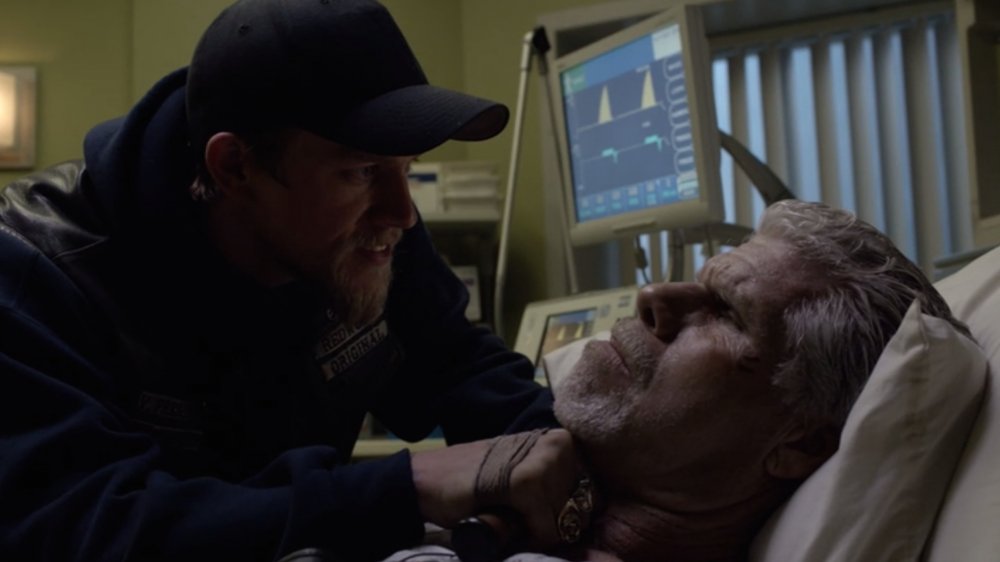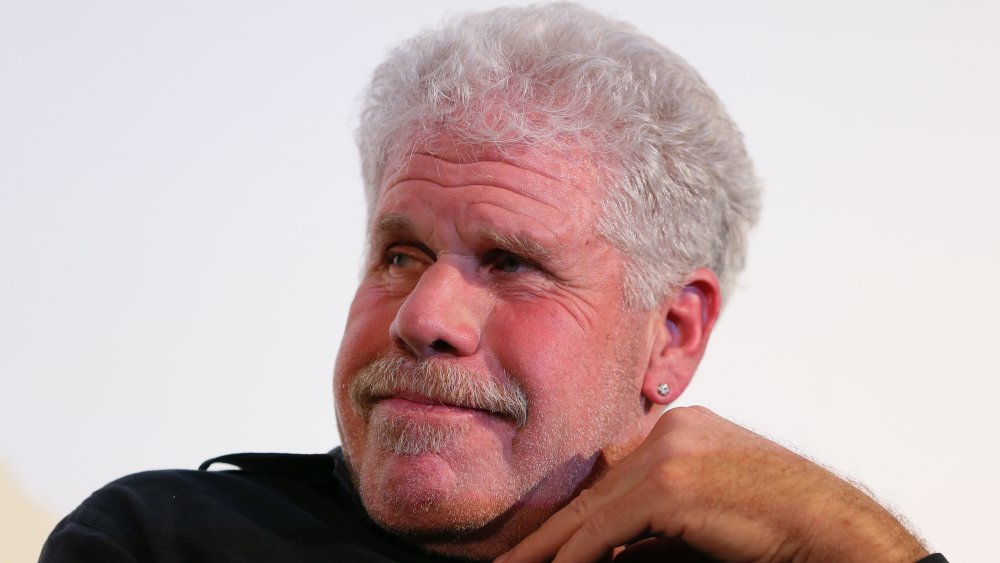The Real Reason Ron Perlman Left Sons Of Anarchy
The violent world of FX's Sons of Anarchy is populated by many, many bad people — on both sides of the outlaw motorcycle cut. Even in light of all that evil company, no one deserved the ugly end they got as much as Ron Perlman's Clay Morrow. For all the horror Clay dragged SAMCRO through, Perlman's charismatic performance as the former president of the Redwood Original Charter won him quite a few fans, many of whom were sad to see Morrow go. Series creator Kurt Sutter was aware of this tension at the time he made the decision to permanently cut Perlman loose.
"As much as people say that they want clay dead, they don't want Clay dead. They want to see it complicated," Sutter told Entertainment Weekly. "They want to see it be complicated. They want to see how Gemma feels about betraying Clay. They want to see how Juice feels about betraying. They want to see that play out even though they, in their gut, they know the guy should be dead."
Sons of Anarchy ended with a bloodbath of a finale way back in 2014, so you'd be forgiven if time has put a gloss on all of Clay Morrow's transgressions. With all the petty acts of murder and dishonesty that pepper the series, it's interesting to note that Clay's most important crime actually happened off screen. SAMCRO President Clay Morrow, who spent so many years acting as a surrogate father to series' protagonist Jax Teller (Charlie Hunnam), actually murdered Jax's real father, John (Victor Newmark), and shacked up with his mother, Gemma (Katey Sagal), before the timeline of the show begins. That one violent act sets Clay and Jax on a collision course that isn't ultimately realized until the show's penultimate season, when Jax finally guns down Clay in recompense for John's murder.
Given all the great drama that Morrow brought to Sons of Anarchy, it's interesting that Sutter decided Perlman had to go before the final season. As it turns it out, that decision had everything to do with the rigorous demands of the story, and the Shakespearean inspiration for Sons of Anarchy's tragic plot.
Clay Morrow was Sons of Anarchy's King Claudius
Sutter has never been subtle with his inspiration. Sons of Anarchy is very much the modernized adaptation of Hamlet that its creator always intended it to be — complete with a few one-to-one character translations. Lest you wonder who's supposed to be whom, Sutter tips you off with a little naming convention. Gertrude, Hamlet's duplicitous mother from the play, is now Gemma; Claudius, Hamlet's murderous uncle, translates to Clay. Jax is, of course, the outlaw MC version of Shakespeare's most famous dithering hero despite the lack of a "Ha" at the start of his name.
In an interview with EW around the time of his series exit, Perlman shared that his departure during season 6 wasn't the result of any behind-the-scenes spat with Sutter or any of his co-stars. If you're looking for someone to blame, blame the Bard. "I'm playing Claudius," the Hellboy actor said, "and Claudius doesn't make it to Act 5. So I was ready for this. If it's an examination of power, you have to see the new king when he's not mirrored by the resonances of the old king. You have to see what he does when he stands alone in the world. And as long as Clay is around, he can't do that."
There's a lot of insight in that answer to unpack. It seems Clay had to leave Sons of Anarchy for the same narrative considerations that drove Shakespeare to kill off Claudius before the final act of his most famous play. In this instance, Jax is the "new king" in Perlman's parlance. Killing Clay in season 6 wasn't just necessary to mirror the source material; it had real narrative consequences for Jax Teller and the tragic character arc he completes in the series finale.
Ron Perlman's departure had nothing to do with Charlie Hunnam ignoring him on set
According to EW, one of the ways Charlie Hunnam prepared for Jax to murder Clay was to ignore his co-star on set for the entire duration of season 6. It's an interesting method, and far be it for us to criticize anyone's approach to craft, but it feels a little odd that he didn't at least tell Perlman what he was up to beforehand.
"I decided as difficult as it was going to be, I wasn't going to talk with him, not even say good morning to him and not tell him why I was doing it," Hunnam said. "I just hoped he would understand, to know that it was just about work and that it wasn't anything personal." Fortunately, Perlman is a consummate professional, and the two exchanged kind words after their final scene together was in the can.
For the sake of Perlman's mental health, it sounds like the exit came just in the nick of time. "I started to have trouble with the stuff that I was being asked to do because I couldn't find a way that I can justify it to myself," he said. "I had to resign myself to playing this guy in a detached way. Looking back in hindsight, I've come up with this treatise: Clay lost his way because he was in a position where the pressure got to him and he started blurring the lines on a daily basis between right and wrong until wrong and right almost looked the same."
Here's hoping the great Ron Perlman gets to play a few more good guys in the future.


